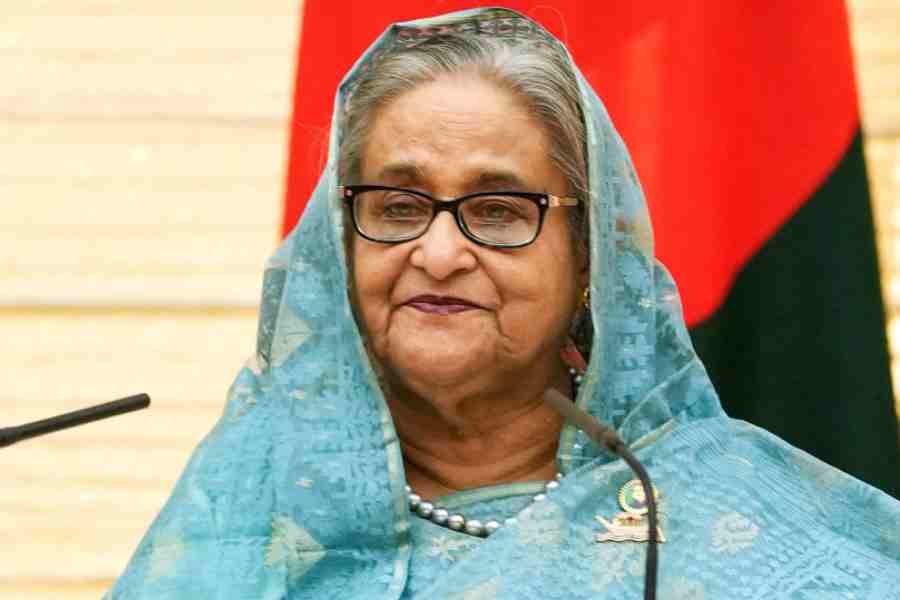Beijing has beaten New Delhi in the race to stand by the Sheikh Hasina-led government in its latest face-off with the US, which announced a new visa policy to ensure free and fair elections in Bangladesh, as the Prime Minister won public appreciation for her anti-US comments from a Chinese foreign ministry spokesperson on Wednesday.
“We have noted the recent remarks by Prime Minister Sheikh Hasina. Indeed, while turning a blind eye to its own racial discrimination, gun violence and drug proliferation problems, a certain country (the US) has long been interfering in the internal affairs of Bangladesh and many other developing countries under the pretext of democracy and human rights,” said Wang Wenbin, spokesperson of the Chinese foreign ministry in response to a question from Global Times on US sanctions on India’s eastern neighbour.
Global Times is a daily tabloid newspaper — an offshoot of the Chinese Communist Party’s mouthpiece People’s Daily — that comments on international issues from a Chinese ultra-nationalistic perspective.
Multiple sources in Dhaka said that the Hasina regime, stung by the new visa rule announced on May 24 and earlier sanctions on its elite paramilitary force, Rapid Action Battalion, has been expecting some support from the two superpowers in its neighbourhood. Against this backdrop, the public appreciation from China for Hasina’s remarks against the US, assumes significance as it comes at a time when Dhaka is in dire need of support ahead of the general elections scheduled later this year.
As Prime Minister Narendra Modi is scheduled to travel to the US on a state visit later this month, there has been speculation in Dhaka on whether he will take up the new visa policy issue with the Joe Biden administration as developments in Bangladesh have a direct bearing on India.
A senior foreign ministry official told this correspondent that it’s logical to assume that India’s concerns with the US policy towards Bangladesh will come up for discussion during Modi’s visit to the US.“India had taken up matters related to Bangladesh with western countries several times in the past... We had spoken against the sanction on RAB earlier. So, it’s logical to expect that the latest developments in the US-Bangladesh relations will feature in the talks,” said the source. Though the Indian foreign policy establishment considers the new visa policy is loaded against Hasina, a trusted ally, New Delhi has not issued any official reaction to Washington’s threat to deny visas to individuals, believed to be responsible for or complicit in subverting the democratic election process in Bangladesh.
After the new visa policy, which was announced by the US secretary of state Anthony Blinken, Hasina put up a brave face and said that the country was “not worried” about such policies and sanctions. In a very nuanced statement, she also spoke about “other oceans and other continents” and the possibility of making friends with them.“It’s no use worrying about who will not issue us visas or who will impose sanctions on us,” said Hasina, who had earlier been critical of the US’s foreign policy misadventures in the name of “democratisation”, especially in Muslim-majority countries. Issues like racism experienced by African-American and the culture of guns in the US have also found repeated mentions in some of her recent speeches.
The comment in which the Chinese spokesperson also spoke about Beijing’s decision to “work together with Bangladesh” to oppose all forms of hegemony and power politics is seen by the ruling Awami League as an endorsement for Hasina.“We firmly support Bangladesh in safeguarding its sovereignty, independence and territorial integrity, upholding independent domestic and foreign policies, and pursuing a development path that suits its national realities,” said the Chinese foreign ministry spokesperson.
In what is perceived as a difficult time for the Hasina regime, Beijing has not only stood by Hasina by appreciating her anti-US remarks but has also ensured that its gesture is widely circulated.
A senior editor of a Bangladeshi daily told this correspondent that the Global Times question and the spokesperson’s reply was sent to all the media outlets by the Chinese embassy this afternoon and within hours it became the top news in the country and television channels began hosting talk shows analysing how Chinese appreciation comes as a comfort for Hasina.
While a comfortable position for Hasina should ideally be good news for India, the Chinese angle in the equation is unlikely to make New Delhi happy.“It was expected that the US action would push her closer to the Chinese... Beijing has extended its arms with this public statement. Why won’t she reciprocate?” asked a source in Dhaka.“We understand India’s reservations with any fresh bonhomie with China... But we must appreciate those who stand by us in difficult times,” added the source.

